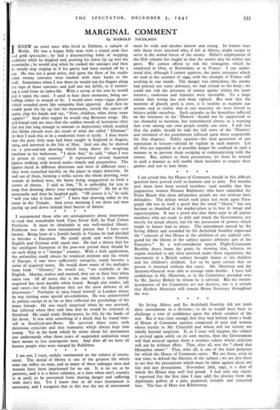I am not, I trust, unduly sentimental on the subject
of intern- ment. The denial of liberty is one of the greatest ills which man can inflict on man, and so many of these unhappy men and women have been imprisoned for no sin. It is no sin to be patriotic, and it is a fierce calamity, at a time when one's country is in peril, to be prevented from sharing danger and suffering with one's kin. Yet I know that in all wars internment is necessary, and I recognise that in this war the net of internment must be wide and meshes narrow and strong. In former wars only those were interned who, if left at liberty, might escape to serve in the armed forces of the enemy. Hitler's employment of the fifth column has taught us that the enemy may be within our gates. We cannot afford to risk the stratagems which he employed at Oslo, at Rotterdam, or in France. I can under- stand also, although I cannot approve, the panic measures which we took in the summer of 1940, with the example of France still seething in our minds. The danger was immediate, the enemy had pierced our outer defences, we had retired to the keep ; we could not risk the presence of enemy agents within the inner fortress ; confusion and injustice were inevitable. To a large extent that wrong has now been righted. But now that the moment of ghastly peril is over, it is healthy to examine our actions and to realise that in our necessity we were forced to behave unlike ourselves. Such episodes as the brutalities inflicted on the internees in the Dunera ' should not be suppressed as too shameful to mention, but remembered always as a warning that even among our own people cruelty can exist. I still feel that the public should be told the full story of the Dunera,' and informed of the punishment inflicted upon those responsible for that disgrace. Public opinion—the final guarantor of our reputation in history—should be vigilant in such matters. Let all who are regarded as of possible danger be confined in such a manner as to prevent them escaping or communicating with the enemy. But, subject to these precautions, let them be treated in such a manner as will enable them hereafter to respect their gaolers and not to hate them.
* * * *






















 Previous page
Previous page